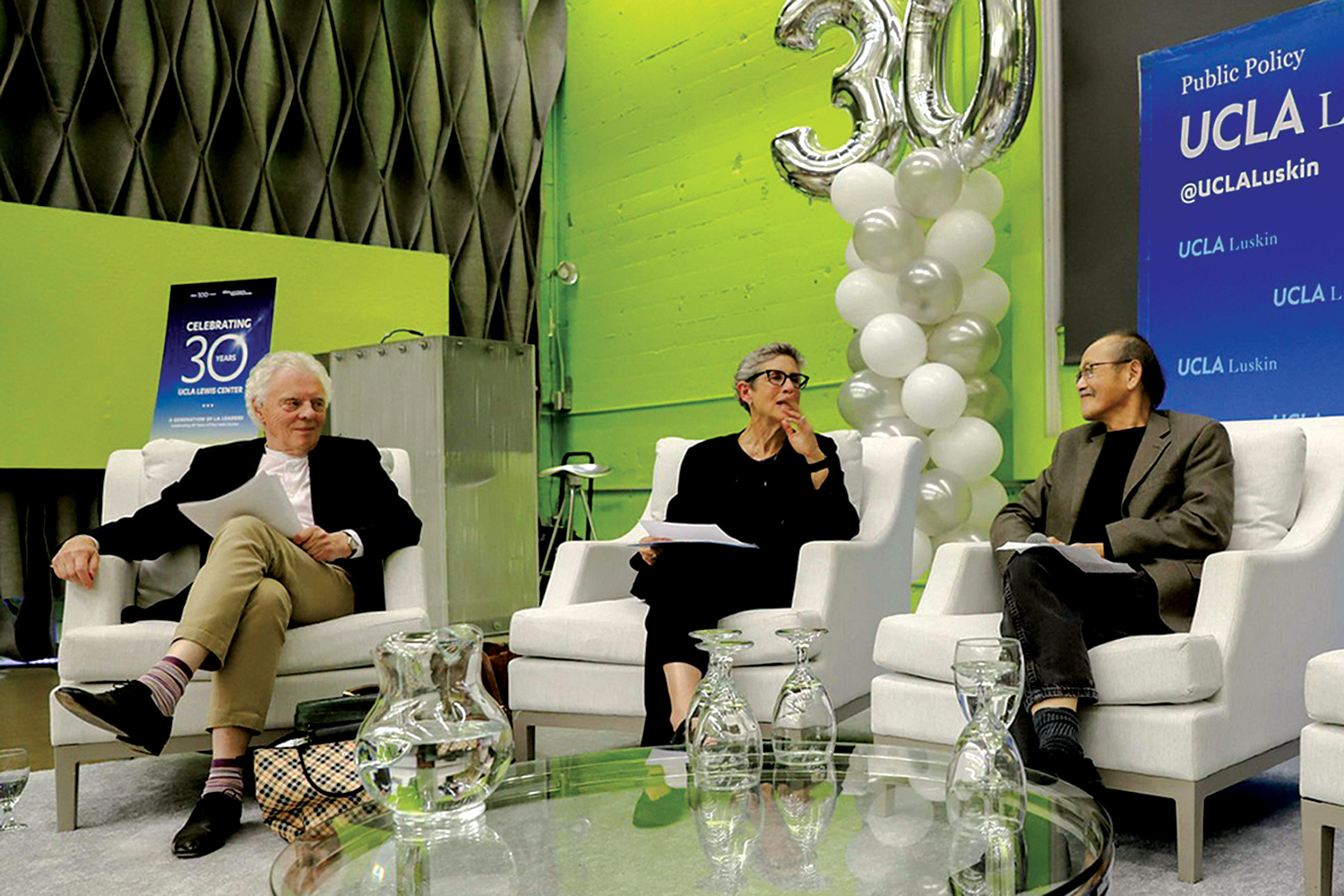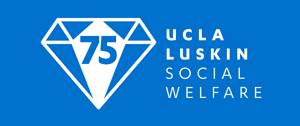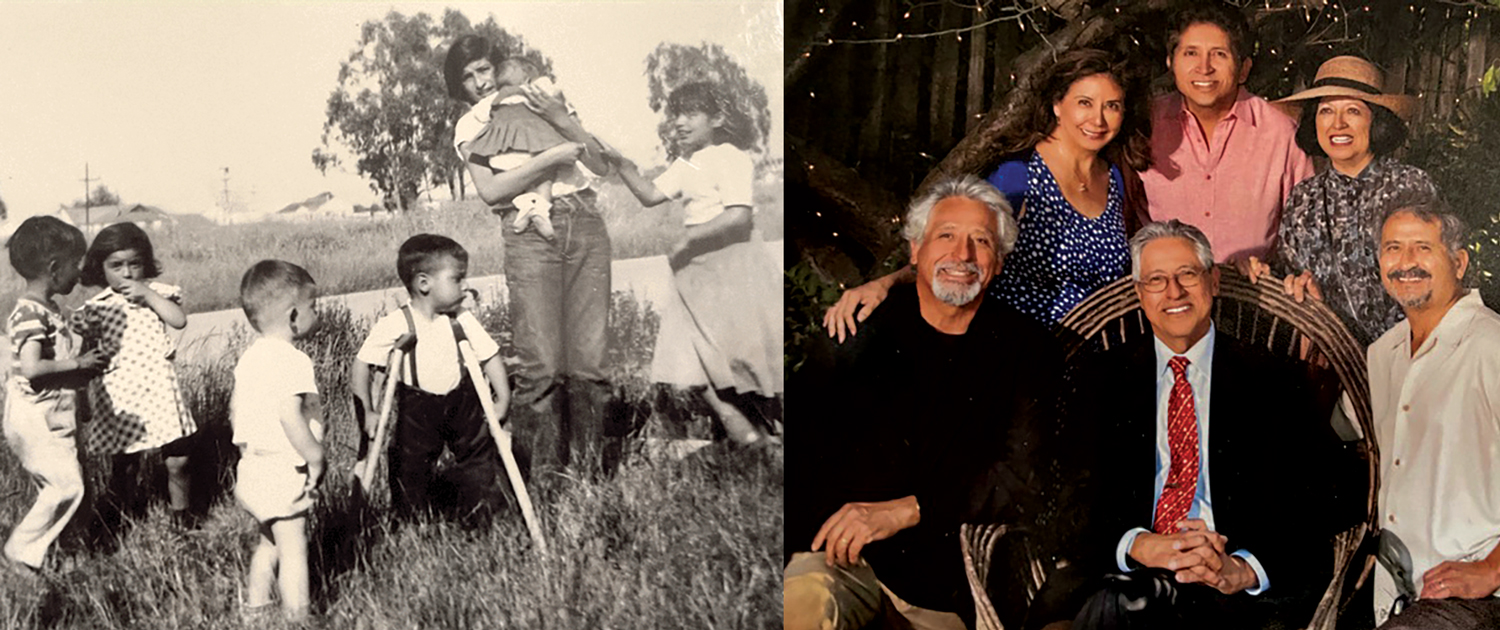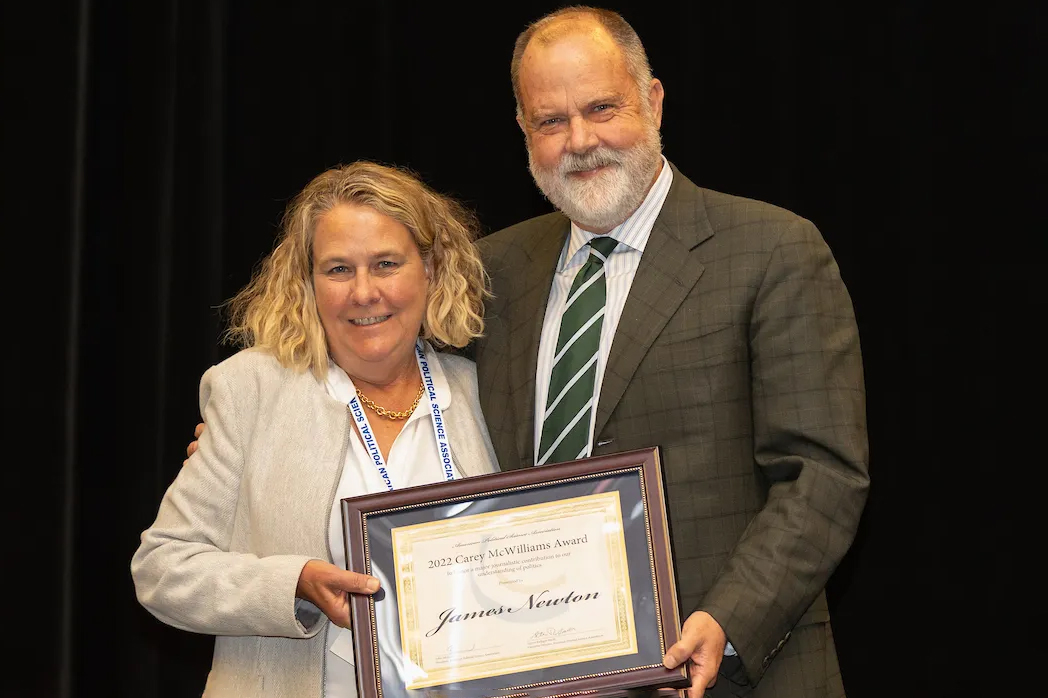The Institute of Transportation Studies was created within the University of California in 1947 and has been in permanent existence at UCLA since 1994. The Lewis Center for Regional Policy Studies marked its 30th year in 2020 with a grand celebration just six days before COVID-19 was declared a global pandemic. Both remain influential and productive, promoting a faculty-student research relationship that for many is a hallmark of the Luskin School experience. Here are interviews with the two current directors and a handful of alumni.
Brian Taylor, UCLA double-alumnus, longtime professor and director of the Institute of Transportation Studies
Why are UCLA and ITS the right fit for you?
Oh, I keep coming back to UCLA. I transferred from Berkeley to UCLA as an undergraduate … and went to graduate school at Berkeley. And then I came back to UCLA for my Ph.D. in urban planning, but at the time it was in the Graduate School of Architecture and Urban Planning. I taught [at another university] for a while and then was recruited to come back to UCLA a third time.
I understand that I was the first faculty member hired in the “School of Public Affairs.” My appointment began July 1st, 1994, and the School began on July 1st, 1994, at midnight.
What we know today as the Institute of Transportation Studies at the University of California … was created by the California Legislature in 1947 to examine the growing transportation needs for the state of California after World War II. The original branch was at UC Berkeley, and eventually a branch was opened at UCLA. It existed from the 1950s into, I believe, the early 1970s, primarily in engineering. … They used to crash test cars in what is now the sculpture garden. They had the tracks, and they’d run them up with the dummies in the cars.
[That version was later moved] from UCLA to Irvine. … In 1994, the branch at UCLA was reestablished, but instead of being in civil engineering, it was established in what’s now the Luskin School of Public Affairs. And the founding director was Professor Martin Wachs.
Transportation is the thing that everybody’s an expert in. Because they all travel.
What makes it unique is that transportation is one of the things that connect all of human activity. It’s education, communication. Where we live, where we work, where we shop, where we play, how we relate to friends. We’ve learned what it’s like to do it by Zoom and that’s one way. And the other way is to come together. And if you come together for activities, whether it’s manufacturing, or to socialize, or to see a sporting event or to go shopping, those things all require transportation systems.
The transportation program at UCLA is fairly unique among universities. … Others tend to have their centers anchored in engineering, and it is very much an infrastructure focus. We are anchored in a school of public affairs. And because of that, our transportation experts, who are known around the world, are not, quote-unquote, transportation experts. They’re people who focus on transportation around some realm. So, take [professor] Donald Shoup. He was basically a land economist who realized that parking had huge effects on urban development and the environment. And as a land economist, he’s become one of the most prominent transportation scholars in the country.
Only the late Marty Wachs and I, and now [recent faculty addition] Tierra Bills as the third, were actually first and foremost transportation people, even though we’re widely considered as one of the top transportation research centers in the country. And because we bring in these experts from these other fields who see the connections to urban design and safety, to the environment and to economic outcomes in poverty, to all of these things connected to transportation, [it] has made us so relevant and so intellectually rich as a result.
How do students benefit from being associated with ITS?
ITS, like many of the other centers, has for years devoted substantial funding to students, offering scholarships to recruit outstanding students, diverse students to the Luskin School. At this point it’s millions of dollars in scholarships. We are the largest single funder of students at UCLA outside of — I have been told this repeatedly — outside of the graduate division in terms of funding our students.
Is there a signature event or a signature activity?
Oh, yes. It’s the UCLA Lake Arrowhead Symposium on the Transportation-Land Use-Environment Connection. We’ve been doing it since ’91. It’s at UCLA’s Lake Arrowhead Conference Center, and we are known internationally for this symposium. It has led to changes in policy at the state and federal level. We have had secretaries of transportation in California, the head of the Federal Transit Administration, and we’ve had prominent academics from around the world
to speak.
Any unmet challenges or missed opportunities over the years?
I think urban planners could have been more intentional about addressing transportation justice and equity issues.
And there is — I hate to use the word disturbing — but the view of transportation in the eyes of many public officials, whether on the right or the left, often involves big projects, concrete and steel. They might favor some projects or oppose others. So, often we are approached and asked, “What can you do to help us? How do I get approval for this project or kill this other project?” But when we engage with public officials, rarely do they just say, “This is a vexing problem. What can we do to address it?”
Urban Planning alumni Andrew Mondschein PhD ’12 of the University of Virginia and Anne Brown MURP ’14, PhD ’18 of the University of Oregon worked with ITS while students; Lance MacNiven MURP ’16 is the national zero-emission lead for WSP USA, a civil engineering firm
How does your career today relate to your time at UCLA?
Mondschein: I’m still really interested in travel behavior and expanding the idea of what accessibility is and how we understand that concept. And that all came from the opportunities, the things that I experienced and the things I got to work on at UCLA. I do work on accessibility, particularly looking at cognitive mapping and understanding how people actually understand the opportunities that are available to them and the way that transportation systems shape that.
MacNiven: Although I never worked for ITS directly, I was very close with Brian [Taylor], and he was kind of a partial advisor with the late, great Marty Wachs for my capstone project. I am the national lead for zero-emission vehicles and fleet planning support and serve as a project manager for
the transition to zero-emission vehicles, primarily for transit and freight.
My capstone was connected to L.A. Metro bus system ridership and basically improving ridership. … I’m back on the bus side primarily with the zero-emission aspect. A lot of my studies and research with ridership and trends definitely inform the duty cycles and other things that we look at on the zero-emission side.
Brown: I’ve always been in transportation equity. Essentially, with the rise of shared mobility during my six years at UCLA, that’s the angle I went. UCLA provided flexibility to pivot into this whole new opening. Back in 2014, we just had no idea what was going on with any of these services.
What stands out about your time at UCLA?
Brown: Brian [Taylor], Evy [Blumenberg] and Marty [Wachs] were some of my primary advisors the entire time
I was at UCLA, kind of like surrogate parents and grandparents in a work context. They all came to my wedding. It’s just a wonderful community.
The support goes beyond the classroom. It’s out of the classroom on research projects. But there’s depth of care that they really invest in you as an individual. And it goes beyond graduation, too. We’re in regular touch. It feels like any time an email pops up or the call comes through, it’s like no time has passed.
Mondschein: Fundamentally, the people at ITS were so supportive and could take anyone that was excited and engaged in transportation and encourage them to think how it might have benefit to society and might be able to change the world.
It was really a special kind of unique environment to be able to talk to like-minded people in a little bit of an educational hothouse. It was a lot of fun.
MacNiven: The professors, you know, it’s full of brainiacs; we could spend all day talking about how smart they are. But it’s the human connection that really draws people in and keeps us tight.
When I first came to UCLA, reading about [Wachs, Taylor and Shoup], I was intimidated. I was like, “Oh, man, there’s Brian Taylor.” But then you get to know him. And, quite honestly, a lot of the times I’m talking to Brian Taylor it’s about college basketball.
Marty was my capstone advisor. He was busy but he accepted me. And I would go to his house on the weekends, you know, to basically bug him with questions. And there were times when my wife had our car, and he would offer to come pick me up to go to his house on a Saturday.
That stuff sticks with you forever. It really shows the community.
Brown: I think about advice I was given early on but have not yet mastered. It’s to think, “What are the questions? What’s the purpose of doing the research?”
You can use research to answer questions that can better transportation, better society, better connect people to opportunities.
I can’t look at a new technology without thinking, “Well, what do we do with this? How can we harness this to better the public good? What are its potential pitfalls and how do we avoid those?” In a lot of ways, my professors are the voices in my head that continue to drive my research agenda. They trained me in their own style. And I am forever grateful for that.
MacNiven: There’s no perfect silver bullet to this in terms of which transportation system we should favor. We deal with this a lot on the zero-emissions side because everyone seems to think that zero emission is the silver bullet to solve all our environmental problems.
But we’re always trying to think about the pros, and the cons. Who are the winners? Who are the losers? And let’s
zoom in on those “losers” a little bit to see how we can mitigate those situations.
It’s not just producing great research, but also trying to translate it into practice.

UCLA Luskin scholars Allen Scott, left, Evelyn Blumenberg and Paul Ong have each led the Lewis Center for Regional Policy Studies during its three-decade history.
Evelyn Blumenberg MA UP ’90, Ph.D. ’95, a faculty member since 1995 and director of the Lewis Center for Regional Policy Studies since 2018
Who works with the Lewis Center and has it changed over its three decades of existence?
I was first involved with the Lewis Center as a student. I did projects through the Lewis Center when I was a doctoral student [when it was still] in the School of Architecture and Urban Planning.
The overall mission of the Lewis Center has held constant, but within that broader mission, each of the directors put their own stamp on the kinds of policy issues they were engaged in, and on who they were collaborating with.
And the areas of emphasis have evolved with the directors. Currently, we do “live,” “move” and “work” as our three areas. A lot of “live” is focused on affordable housing qualities of neighborhoods. “Move” is the work we do on transportation in the region. And “work” reflects our interest in jobs and the regional economy.
We work with students in all of the graduate and undergraduate degree programs.
The Lewis Center, like some of the other centers in the Luskin School, helps fund capstone projects in all three departments. And there are also students who get funding from the Lewis Center and write policy briefs that are based on their work.
We also help solicit some of the capstone projects. We do a broad solicitation, but many of [the clients] are alumni. Some of them had been involved in Lewis Center projects when they were students. It’s like match.com, where we try to match our great students with great projects. And that’s one way in which former students who are now alums can participate.
How do faculty benefit from their association with the Lewis Center?
Faculty are really good at academic research. And they can figure out how to fund academic research. And, you know, they have to produce academic scholarship in order to get promoted. That happens with or without the Lewis Center.
The Lewis Center allows them to amplify the policy implications of their research.
Certainly, they apply for funds through the Lewis Center, and that helps their academic portfolio. But the big advantage is that we have the ability to help them promote their findings to communities, to elected officials and to other stakeholders.
And we do it in a number of ways. We create reports and policy briefs. We have started a podcast around housing and affordable housing. We structure a lot of our events around the scholarship of faculty. They can use those events as a way of getting out their research and the policy and planning recommendations that fall from it.
And being involved with Lewis Center is a vehicle for bringing faculty and students together on topical areas. As an individual faculty member, oftentimes you’re working on your own. The centers offer a collegial place to interact and to creatively think about how to pursue policy interventions.
We’ve had meetings where all we do is brainstorm. We think about bringing faculty and students together to think about what the next round of research should be. So, it’s
an incubator.
I got into this business to make a difference, right? To improve communities, to make life better for low-income households. This is an opportunity to translate the research into policy, and to do it with others.
 As UCLA Luskin Social Welfare celebrates the 75th anniversary of its founding, Torres-Gil will retire after more than three decades helping to advance the School’s educational mission as a professor of social welfare and public policy. He has served as chair of Social Welfare, associate dean and acting dean, as well as founding director of UCLA’s Center for Policy Research on Aging.
As UCLA Luskin Social Welfare celebrates the 75th anniversary of its founding, Torres-Gil will retire after more than three decades helping to advance the School’s educational mission as a professor of social welfare and public policy. He has served as chair of Social Welfare, associate dean and acting dean, as well as founding director of UCLA’s Center for Policy Research on Aging. 


